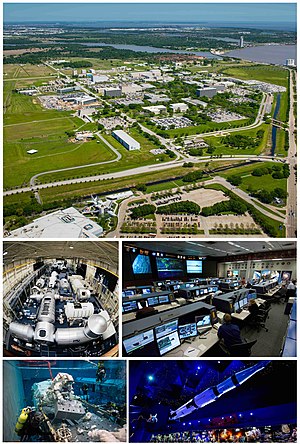
Back مركز لندون بي جونسون للفضاء Arabic مركز لندون جونسون للفضا ARZ Касмічны цэнтр імя Ліндана Джонсана Byelorussian Svemirski centar "Johnson" BS Centre Espacial Lyndon B. Johnson Catalan ناوەندی لیندۆن بی جۆنسۆنی بۆشایی CKB Johnsonovo vesmírné středisko Czech Lyndon B. Johnson Space Center Danish Lyndon B. Johnson Space Center German Διαστημικό Κέντρο Τζόνσον Greek
Lyndon B. Johnson Space Center | |
 Top to bottom, left to right: Aerial view of JSC with Space Center Houston in the foreground, Space Vehicle Mockup Facility, Christopher C. Kraft Jr. Mission Control Center, Neutral Buoyancy Laboratory, and the Space Center Houston Saturn V exhibit. | |
| Abbreviation | JSC |
|---|---|
| Predecessor | Space Task Group |
| Formation | November 1, 1961[1] |
| Location | |
| Owner | NASA |
Director | Vanessa E. Wyche |
Staff | 3,200 civil service |
| Website | JSC home page |
Formerly called | Manned Spacecraft Center |
The Lyndon B. Johnson Space Center (JSC) is NASA's center for human spaceflight in Houston, Texas (originally named the Manned Spacecraft Center), where human spaceflight training, research, and flight control are conducted. It was renamed in honor of the late U.S. president and Texas native, Lyndon B. Johnson, by an act of the United States Senate on February 19, 1973.
JSC consists of a complex of 100 buildings constructed on 1,620 acres (660 ha) in the Clear Lake Area of Houston. The center is home to NASA's astronaut corps, and is responsible for training astronauts from both the U.S. and its international partners. It also houses the Christopher C. Kraft Jr. Mission Control Center, which has provided the flight control function for every NASA human spaceflight since Gemini 4 (including Apollo, Skylab, Apollo–Soyuz, and Space Shuttle). It is popularly known by its radio call signs "Mission Control" and "Houston".
The original Manned Spacecraft Center grew out of the Space Task Group (STG) headed by Robert R. Gilruth that was formed to coordinate the U.S. crewed spaceflight program. The STG was based at the Langley Research Center in Hampton, Virginia, but reported organizationally to the Goddard Space Flight Center just outside Washington, D.C. To meet the growing needs of the US human spaceflight program, plans began in 1961 to expand its staff to its own organization, and move it to a new facility. This was constructed in 1962 and 1963 on land donated by the Humble Oil company through Rice University, and officially opened its doors in September 1963. Today, JSC is one of ten major NASA field centers and the city of Houston's primary cultural footprint, earning it the official nickname "Space City" in 1967.
- ^ Grimwood (1963), p. 152.